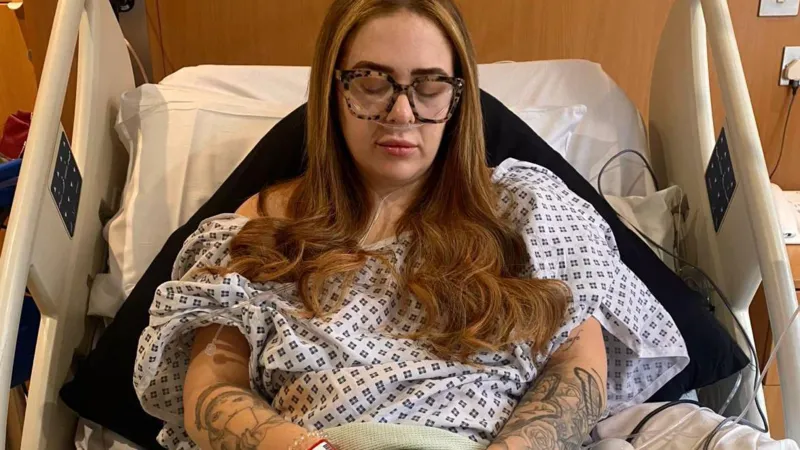Medical misogyny sees women told to 'put up' with pain

Women experiencing painful health issues are told to "put up and shut up," a 32-year-old awaiting surgery for a "horrific" gynaecological condition has said.
Gabriella Pearson started her periods aged 10, calling them "painful from the start". She is no longer able to work and she cannot have children naturally.
She said she had learned to "just get on with it because that's what you're told your whole life - especially as a woman".
She spoke to the BBC as MPs warned "misogyny in medicine" was "leaving women in pain and their conditions undiagnosed".
Women with conditions including heavy periods, endometriosis and adenomyosis are being dismissed when they ask for help, members of Westminster's Women and Equalities Committee concluded.
Chairwoman Sarah Owen said women were being "fobbed off" and said "it would not happen if it was a man".
She called for more investment in and support for women's reproductive health conditions.
The government described the situation as "unacceptable" and said it would "overhaul women's healthcare".
Diagnosis and treatment for these common issues can take years, the committee's report said, leaving women and girls in so much pain that it disrupts all aspects of daily life.
The report follows an inquiry which saw its members interview women about their experiences, including BBC presenter Naga Munchetty and TV personality Vicky Pattison.
Misogyny is defined as feelings of hatred towards women, or the belief that men are much better than women.
Owen, a Labour MP, told Naga Munchetty on BBC 5 Live that it was "hard to describe" the situation as "anything else".
Women are "told it's normal, it's just pain, let's wait another few months of your cycle to see if it gets any better," she said.
She added it was not a criticism of male doctors, but rather a "systemic misogyny that we need to address".
Owen said she had been diagnosed with adenomyosis in the summer and that "it feels like you have to prove you're not being a wimp".
"Actually, women are incredibly pain tolerant. One of the most painful things you can do is give birth.
"And yet we are being told we are complaining unnecessarily."
The committee's report found a "clear lack of awareness and understanding of women's reproductive health conditions among primary healthcare practitioners".
It cited a stigma and lack of education around the conditions, mirrored by a lack of medical research, specialists and treatments.
This means gynaecological waiting lists have grown faster than any other medical specialty in recent years.
The report calls on the NHS to "urgently implement a training programme" to improve the experience of women and girls accessing diagnosis and treatment for gynaecological conditions.
BBC News recently reported that waiting lists for gynaecology appointments across the UK had more than doubled since 2020, with around 755,000 women's health appointments waiting to happen.
Many women shared their experiences of waiting in agony for vital treatment and often having to pay for private care.
Claire, 40, paid £10,000 for a hysterectomy 12 weeks ago to relieve her debilitating symptoms of endometriosis and adenomyosis - she would have had to wait three years for the same operation on the NHS.
Bethany, 27, was diagnosed with endometriosis seven years ago and told she needed to chose between having children or having her womb removed. She sought a second opinion from the NHS, but by the time she had an initial procedure, she could not move her legs without pain.
She is now exploring treatment for ongoing issues through private health insurance.
"I can't put into words how profound the grief is for the life that I could've and should've had," Bethany said.
Meanwhile, Gabriella is waiting to have a hysterectomy next year due to her adenomyosis, a condition she describes as "horrific".
"We normalise high amounts of pain, heavy menstrual bleeding and all the bowel symptoms that you get with conditions like endometriosis, adenomyosis, fibroids, polycystic ovary syndrome (PCOS) - and it's just really sad."
Sarah Owen said women were "waiting years for life-changing treatment and in too many cases are being put through trauma-inducing procedures".
"All the while, their conditions worsen and become more complicated to treat."
Up to one in three women live with heavy menstrual bleeding while one in 10 have a condition such as endometriosis or adenomyosis, she said.
According to an analysis by the Office for National Statistics, 2% of women aged 15-49 are estimated to have an endometriosis diagnosis, although it said many more will be affected and won't have a diagnosis.
"It cannot be right that despite the prevalence of these conditions, that such a lack of understanding and awareness persists," Owen said.
She also called for women with a suspected or diagnosed reproductive health condition to be offered specialist mental health support.
Dr Henrietta Hughes, patient safety commissioner for England, welcomed the report, saying the NHS needed to take "a long hard look" at the way patients are involved in their care.
"We need to treat patients as partners, make sure that they are well-informed, listened to and that they have a good experience of care," Dr Hughes said.
A Department of Health and Social Care spokesperson in England said it was "totally unacceptable that women with reproductive conditions are not getting the care they need and that their voices are not being heard".
"That is why we will overhaul women's healthcare, placing women's equality at the heart of our agenda, and ensure women's health is never again neglected."
They added that an extra £26bn was being invested into the NHS and, with that, the government would get the service "back on its feet so it delivers for all patients".
Health ministers in Scotland, Wales and Northern Ireland say plans are in place to tackle long waits for treatment.
A spokesperson for the Welsh government said women's health had been made "a key priority".
Source: BBC
























































